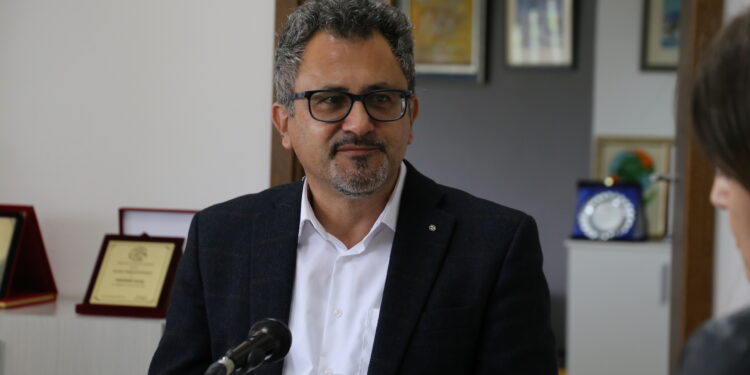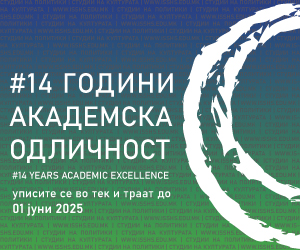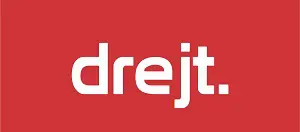Saving energy, protection of natural resources, and through transformation of waste with value, landfills as potential environmental bombs are reduced, which by burning pollute the air, soil and water. These are the biggest benefits of waste recycling. The “Pakomak” company has also been advocating for this for years, which is the first and biggest waste handler in the country. In the meanwhile, other companies have emerged for packaging waste, for electronic waste and batteries, and the focus of “Pakomak” is circular economy, as a concept of sorting, recycling and reusing waste.
“Circular economy, in terms of the material flows in the industries, is only possible if each year we spend less natural resources than the previous one and if the population on the planet remains the same”, says the Director of “Pakomak”, Filip Ivanovski.
According to him, the two things are hardly sustainable variables.
“But we can use less packaging and recycle and reuse more of what has already been used. Circular economy is a philosophy and a way of living, and not just a mathematical-economic operation. Changing habits is a major challenge that we in “Pakomak” are also facing. It’s a slow process, but we are glad that it already exists as a process and that we were one of the catalysts of that positive social change. The institutions need to channel and give these processes a legal form, and be the first to implement them as well”, he explains.
Ivanovski says that if the experience is compared, the awareness of companies has slowly increased in terms of recycling; for comparison, in 2021, at the beginning, around 6 tons of waste used to be collected, as opposed to today’s 30 tons.
“An increasing number of companies report and pay for waste collection and realize that they have to take care of the waste they generate from their products. Recycling is not the most important thing in the circular economy, but rather reducing, so many companies that previously had heavier packaging are now looking to reduce it. For example, if previously it was normal to have a 40-gram packaging for water or juices, nowadays, you have 22-gram bottles that fill 1.5l of water, but certainly they are slowly realizing that they need to produce recyclable packaging, because there are still companies that use packaging that is not recyclable”, Ivanovski explains.
Regarding the legal regulation, he says that our legislation is good, but that its implementation is a problem, more specifically, laws need to apply to everyone.
“Together with the Chambers of Commerce, we are trying to find companies that release waste during their production process, but are not in the system, they don’t pay or store properly, let alone recycle. We need institutional support here, primarily of the inspection services, because our mentality here is as such that until an inspection comes, most companies will usually say they were not informed about certain laws”, he says.
According to Ivanovski, financial resources are needed for bigger reforms, because currently around 2 million euros annually are collected from the companies registered in the system of the three existing companies taking care of the waste they generate, which divided per capita is around 2 euros, while in Bulgaria for example 6 euros are collected, in Germany 12 euros and in Greece 8 euros.
Ivanovski says that over time, the infrastructure also needs to increase for citizens to be able to properly separate waste, because there is not enough of the necessary infrastructure. The company is trying to achieve a norm of 3 bins for paper, plastic and glass per 1,000 inhabitants. This means that in Macedonia there should be 5,000 bins just for sorting waste.
The research of “Pakomak”, from the aspect of the habits, shows that if 6 years ago citizens used to say that they always or often separate waste, now 45% say that they always or often separate it at home. In numbers, this is an indicator of a positive trend in the habits of the citizens. Fewer and fewer citizens, on the other hand, say that they never sort packaging waste.
“Still, we should work also on public awareness of the citizens, because very often, although they have appropriate bins for waste disposal, they use them for household waste, so you will find leftovers from food in bins for plastic. Therefore, it would be nice to give them motivation and stimulation, and that is how we started with the process of installing reverse vending machines for plastic, currently in 25 locations in Skopje, and by the end of the year we will expand that to 30 machines that will collect plastic and cans, and that is clean material because it is not mixed with other garbage, and in return, points are collected through the application with which you can later shop in certain markets”, says Ivanovski.
“Pakomak” is the first Macedonian company that in the Republic of North Macedonia introduces the world trend in separating – reverse vending machines for collecting plastic bottles and cans, established in 2010 by 11 companies, mainly beverage producers, but also two factories for oil and is one of a total of three companies in the country, so-called collective handlers, whose role is to collect waste from plastic, paper and glass produced by companies. They also collect cans, metal waste, but also cardboard packaging and wood. Currently, about 580 companies pay all five companies a pre-determined rate per kilogram to collect, separate and recycle waste that would otherwise end up in a landfill.
Sonja Taneska
Video and editing: Arian Mehmeti
Photography: Biljana Jordanovska
Translation: N. Cvetkovska
The video is part of the large regional initiative for marking the Western Balkans Circular Economy Week (May 22-26, 2023) under the slogan “Partnership for Circularity” that is implemented by the LogEx regional network, of which CIVIL is a member, at the initiative of the prominent think-tank organization Balkan Forum from Kosovo, and with the support of Rockefeller Brothers Fund from the United States.

















